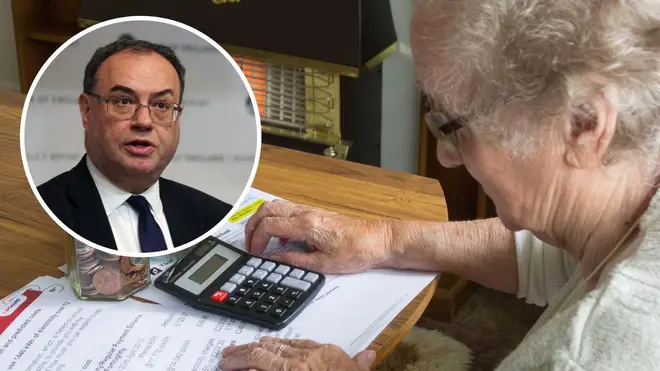
James O'Brien 10am - 1pm
3 February 2022, 15:02 | Updated: 3 February 2022, 16:56

The Bank of England has warned families will face the biggest fall in living standards in the last three decades as energy costs spiral, interest rates soar and the cost of living stretches even further.
On Thursday, energy regulator Ofgem confirmed the energy price cap will rise by £693 per year to £1,971, with millions of people facing an eye-watering £700 hike in their energy bills come April.
Ofgem said the 54 per cent increase was forced by a record increase in global gas prices, and it is expected to affect 22 million customers when it comes into effect.
Following the cap hike, the Bank of England has announced another increase in interest rates from 0.25% to 0.5%.
It also said it expects Consumer Price Index (CPI) inflation, which rose to a near 30-year high of 5.4% in December, to move close to 6% in February and March.
It then expects this to peak at 7.25% in April, following increases to energy prices, before decreasing.
It has warned that families are about to suffer the biggest fall in living standards since comparable records began three decades ago.
Read more: Energy bills soar by £693 and interest rates double as support branded 'sticking plaster'

Single mum Lowri Williams only has £41 to her name once all her bills are paid out each month
New forecasts by The Bank of England show that disposable incomes will shrink by 2% this year, and by another 0.5% in 2023.
That would be the biggest annual reduction in spending power since at least 1990.
Read more: Millions pushed into poverty in energy crisis, warns plumber who helps families for free
With many expected to be plunged into fuel poverty as a result of the rise in energy bills, Chancellor Rishi Sunak has announced support for households of up to £350 to "take the sting out" of the hike.
The support offered will be split into three categories - £200 discounts on bills, a £150 council tax rebate for those with properties in bands A-D, and giving local authorities a discretionary fund of £150 million to "help those lower income households" who may live in higher council tax properties, or who are exempt altogether.
Bank governor Andrew Bailey said the Chancellor's support measures would help take some of the pressure off households.
In response to concerns that the back-to-rate rises come at the worst time for households, he said: "If we don't take this action, it would be even worse.
"I know it's a hard message."

£200 discount will be automatically applied to electric bills
Despite acknowledging the cost-of-living crunch, Boris Johnson insisted the rise in National Insurance had to go ahead in April to address the "colossal" NHS backlog.
"We have got to put in the money to fix it - nine million more scans, 50,000 more nurses, building the hospital capacity that we need - it's the number one priority of the British people and we've got to fund it," he said.
The tax rise was "not what anybody wants to do, it's not what Rishi (Sunak) wants to do, it's not what I want to do, but we have got to do it".
Rachel Reeves MP, Labour's Shadow Chancellor of the Exchequer, said the Government's proposals will be "of little comfort to many".
Read more: Energy price cap rise: Sunak to hold press conference as energy bills rocket - LIVE

The government will give people a £150 council tax rebate this April
"The Chancellor wants to load costs on taxpayers with a buy now, pay later scheme – while Labour will keep bills low with a windfall tax on North Sea oil and gas producers with booming profits," Ms Reeves said.
“In the midst of a cost of living crisis, the Government’s proposals will leave families in Britain paying hundreds of pounds more as a result of the breathtaking rise in energy prices. It will be of little comfort to many.
“Labour would raise money to keep bills low through a one-off windfall tax on oil and gas profits, to support all households, with households typically getting £200 off their bills.
“Labour’s plan will get £600 to the lowest income households while the Conservatives will only give them £350.
“The Conservatives don’t have an answer to the cost of living crisis because they are the cost of living crisis.”